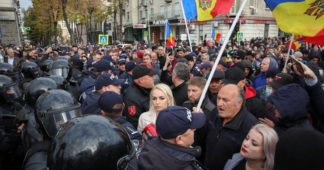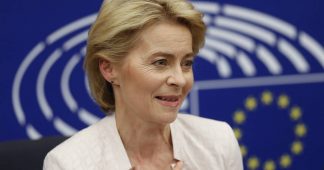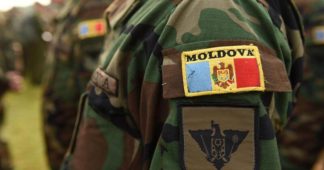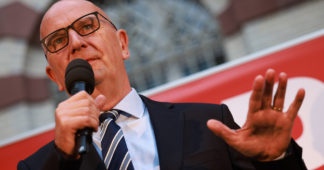By Salvador Greco
The shock suffered by the pro-Western wing in Moldova and its international supporters on the night of last Sunday’s, 10.20, elections is difficult to describe. The country’s president, and re-candidate, Maya Sandu kept postponing her statements during the night. Finally, when she spoke she began to denounce ”criminal organizations”, ”foreign interventions”, ”oligarchs”, for attempting to falsify the election result. And all this at the moment that all the state and electoral mechanisms in Moldova are closely controlled by her and her party, which has an absolute parliamentary majority. The statements of von der Leyen and Borrell, behind the pseudo-triumphal rhetoric, hid disappointment and concern for the future. The reason was the unexpected result mainly in the referendum on the amendment of the Constitution, which will include provisions which are supposed to make the course of Moldova’s integration into the EU irreversible.
The facts are as follows: On Sunday October 20, one of the most crucial election battles took place in Moldova. The citizens were invited to vote for a new president, but also in a referendum on the change of the Constitution, which will enshrine the European path of one of the poorest countries in Europe. However, the simultaneous elections were one of the many tools of the attempt to manipulate political developments on the part of the West against Russian influence.
The election process took place amid legitimate concerns of Moldovans that their country might become embroiled in the Ukraine war, especially if it spirals out of control with the direct involvement of third parties. There is also fear that the political processes, moving from the backstage, will lead to a civil war. Even more so, as the proposed changes to the Constitution, in part, reflect those made in the Ukrainian Constitution in 2019, which stipulated that Ukraine’s strategic goal is to join the EU and NATO.
It is worth noting that Chisinau has recently been visited successively by the German chancellor and the presidents of Estonia, Lithuania, Latvia, Romania and Poland. A week before the elections, von der Leyen also arrived, offering two billion for social programs, two thirds as a loan. He was preceded by Blinken, who pledged 124 million for energy security and countering Russian disinformation. The aim of the visits and the holding of the referendum was the re-election of the current president Maia Santu.
Yet, despite the general certainty that had been formed in the domestic and international opinion that the Moldovans with a large majority, at least close to 60%, will vote for the European perspective of the country, the polls showed a deep internal division. In fact, those living inside Moldova turned out to be against this European perspective and indeed with a large lead. The final victory of “Yes” was a result of the positive vote of the Moldovan diaspora in the West, which is however overshadowed by the absence of guarantees of validity.
In fact, until the moment when more than 90% of the votes had been counted, “No” in the referendum prevailed, at a rate of almost 54%. “No” was in the majority almost everywhere in all of Moldova – except of course Transnistria where no polls were set up. In seven administrative units of Moldova, “No” received over 70%. And in the Autonomous Region of Gagauzi it reached an impressive 95%! Even in the capital Chisinau, where it was considered that the European dream is an absolute majority, “No” received 44%. Overall, Moldovans voted in the referendum against joining the EU by 54.43%.
With these unexpected results in front of their eyes, Sandou and her staff expected the miracle, which indeed came from abroad. Then, in the last 10%, the results from the count abroad started coming in, mainly from Europe, USA and Canada. The new influx was such that it overturned the final result, as 76.96% of voters (181,254) voted “Yes”, while 23.04% (54,249) voted “No”.
The problem is that voting abroad is essentially not subject to transparency. The electoral process is conducted in the premises of the country’s consulates with employees of the Ministry of Foreign Affairs, without electoral representatives and international observers. In addition, the results of the counting are sent after those of the polling stations within the country. So, they can be configured accordingly.
It is also worth mentioning that the foreign polling stations were 60 in Italy, 28 in Germany, 17 in the United Kingdom and the USA and only 2 in Russia, where about 400,000 Moldovans live. In any case, the final results of the referendum recorded that 50.46% (751,235) voted in favor of adding to the Constitution provision on the European future of Moldova and 49.54% (737,639) voted against.
In the presidential elections the incumbent president in Sunday’s elections came first, receiving 42.45% (656,354 votes). However, in the second round she has to face former Prosecutor General Alexander Stoyanoglo, who managed to get 25.98% (401,726 votes), when polling gave him till 12%. Despite the big difference between Sandu and Stojanoglou, the former Prosecutor starts from a much higher starting point, because all the other candidates who follow and received some serious percentage belong to the anti-Sandou front.
First, the former mayor of the city of Balti, Renato Usati, who came third in elections, with a percentage of 13.79% (213,168), and then the former head of the autonomous region of Gagauzi, Irene Vlach, with 5.38 % (83,226), the former prosecutor Victoria Furtune with 4.45% (68,779), and former prime minister Vasily Tarlev with 3.19% and 49,317 votes.
As a result, the referendum with its marginal and controversial result tarnishes the European perspective of Moldova, and Sandu candidacy is not sure in the runoff elections on November 3rd.
Naturally, all of the above certainly does not give any justification for solemn declarations. Rather, they are a cause for skepticism about the policies that have been followed and made the Moldovans wary of the ‘gifts’ they would receive from a future EU membership.
Undoubtedly, the war in Ukraine played a dominant role in the wariness of the citizens of the poorest country in Europe, affected by the economic crisis.
Moldova had always maintained an equal distance policy from all involved, Russia, Ukraine, Romania and the West. In this way it hoped not to disturb its security and to develop its trade, which has suffered to a great extent since the fall of the Soviet Union. The pro-Western Sandu, however, changed the directions of Chisinau’s foreign policy. The identification with NATO, the EU and Kiev policy, terrorized the citizens, who anxiously see themselves becoming part of the problem.
The second main reason for the rejection of the EU is Sandou’s failed economic policy, combined with rampant corruption. European funds are not channeled for social welfare, but are directed to other purposes. This was also the reason why it was decided to hold the referendum together with the presidential elections. The initiators of the idea believed that the large percentage in favor of the EU would also strengthen Sandou’s candidacy.
Background
Landlocked Moldova has a border of 1,202 km with Ukraine and 683 km with Romania. It even has significant parallels with Ukraine. One is the identity divide. Half of the population considers that it belongs to the wider Romanian nation, as the eastern part of the old Moldavian hegemony, that which, as Bessarabia, was acquired by the Russian Empire in 1812 from the Turks.
In this context, the political processes are sealed by the dominant dilemma, as in Ukraine: Choice between the West and Russia, between Romanian-Moldovan nationalism and pro-Russian “internationalism”. The struggle for influence has been fierce and now is becoming fiercer. The West is persistently trying to reduce the pro-Russian political presence, with the vehicle of joining the EU (from which it has already received an invitation) on the one hand, and NATO on the other, in order to cancel a Russian bridgehead in the rear of Ukraine.The rest of the population – a mixture of ethnic groups – is mostly ethnically Moldovan- have a positive disposition towards Russia. According to a recent poll, “only 46% of Moldovans see Russia as a moderate or great threat to their country, while 53% rank it among the country’s most important economic partners – behind the EU at 66% and neighboring Romania with 69%. Similarly, half of the respondents see Russia as one of the country’s most important political partners.”
In addition, in Moldova, as early as the beginning of 1990, precisely as a reaction to the then plans for union with Romania, the breakaway region of Transnistria (475,665 inhabitants, 2015 census) emerged – with the help of the Russian army – with the majority of inhabitants to be Moldovans but also a significant percentage of Russians and Ukrainians. It survives the presence of a Russian force of 1,500 soldiers. Transnistrian-Moldovan relations are not hostile, unlike what happened between Kiev and eastern Ukraine. Indeed, opinion polls have never shown that the return of Transnistria is a priority for the citizens of Moldova. It’s not even in the top 10 most pressing problems. A Russian force of 1,500 troops currently remains in the area. Transnistrian-Moldovan relations are not hostile, unlike what happened between Kiev and eastern Ukraine. Indeed, opinion polls have never shown that the return of Transnistria is a priority for the citizens of Moldova. It’s not even in the top 10 most pressing problems.
There is also the small autonomous region of the Gagauz, Turkish-speaking Orthodox Christians (about 130,000), whose ancestors replaced, together with other Christians, the Muslims of the Nogai tribe, who lived until the beginning of the 19th century in the Bunjak region in southern Moldavia . Recently, Gagauzian politicians have come under Western sanctions.
The internal contradictions, in a depressed economic climate, caused by the dissolution of the Soviet Union and its economic networks, resulted in an unprecedented demographic crisis, with a steep decline in births and a huge wave of immigration. According to the latest reliable data, in January 2021, the permanent population of Moldova was 2,597,107 people. According to the Ministry of Foreign Affairs and European Integration of Moldova, its citizens living abroad are at least 1,250,000.
Sandou, a Harvard graduate and former World Bank official, was elected president in November 2020, seen as anti-corruption and pro-European. In 2021, her party (Action and Solidarity Party -PAS) won the majority in the parliamentary elections, giving her the comfort to implement her program. Three years later, Moldova remains mired in economic and political instability. The country received the largest number of Ukrainian refugees per capita and this put pressure on its healthcare system, public services and infrastructure. At the same time trade with Moscow and Kyiv collapsed. Inflation rose up to 40%. In the winter of 2022, a serious energy crisis occurred because Moldova was heavily indebted to Gazprom, even though it buys at lower prices from markets. Power outages occurred as Soviet-era energy systems remained connected to Ukraine’s.
In the face of social disillusionment, Sandou played the card of anti-Russianism and internal enemy. He took a stand in favor of Ukraine and accused Moscow of trying to overthrow its government. He pointed to businessman and politician Ilan Shor, who was forced to flee to Russia when he was accused of embezzling $1 billion from banks, as an instrument of Russian infiltration. Recently, the Police announced that it has dismantled a network of bribery with 15 million dollars of more than 130,000 Moldovans, with the intention of voting no in the referendum and in favor of pro-Russian candidates.
In the same context, a candidate from the opposition bloc Pobeda (Victory), Vasily Bolya, was banned from participating in the elections, while the operation of the party was also banned. Bans and searches in party offices also happened in other cases, such as in the “Renaissance” party. The authorities also moved against the leadership of the semi-autonomous Gagauzia. The US and EU actively participate in the attack with sanctions against its president, Yevgenia Gutsul. There have also been reports of searches of the homes of Gagauzian students participating in educational programs in Russia.
The difficult road to the runoff
On 3th November for the second round presidential elections, Sandou as the only candidate of the pro-Western bloc, does not have to wait for any new pool of votes, and everything will depend on turnout. Of course, there are also “foreign” voters, who will almost exclusively vote for Sandou. However, given the first elections and Referendum rates, excesses theoretically have a limit. There is also the nationalist argument of Stoyanoglo’s origin, that a Gagauz can’t become president of Moldova. The pro-European democratic wing has no problem throwing this into the arena of political confrontation, in order not to lose, even if it “smells” racism.
But even in the case of Sandu’ victory, crucial parliamentary elections will be held in a few months, and the mood for the president’s party is not good. All plans, if the parliamentary majority is lost to the pro-Western camp, may be overturned. The title of an article in the Ukrainian “Yevropeysʹka pravda” describes the hard truth: “Moldova vs. Europe. How Sandu’s “victory” in the elections turned into a disaster”.
The narrative presented as the only reality is suffering deep cracks right next to the furnace of the Ukrainian war. So something went wrong. Probably, however, it is impossible at the moment that the decision-makers will be able to look for it and fix it. It is more likely that they will increase the pressure to prevent the unpleasant developments that are clearly now on the horizon. With Moldova itself and its inhabitants as victims.
We remind our readers that publication of articles on our site does not mean that we agree with what is written. Our policy is to publish anything which we consider of interest, so as to assist our readers in forming their opinions. Sometimes we even publish articles with which we totally disagree, since we believe it is important for our readers to be informed on as wide a spectrum of views as possible.











